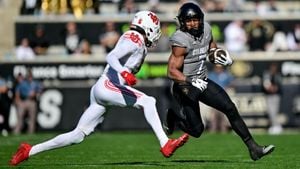Elon Musk, the billionaire tech mogul and CEO of Tesla and SpaceX, is no stranger to legal woes. Recently, he has found himself at the center of multiple lawsuits, turning the spotlight onto his political committee, America PAC, as well as tech giants like OpenAI and Microsoft. These lawsuits reflect Musk's combative business style and raise serious questions about his practices and public statements.
One of the most significant legal battles Musk has faced involves his recent expansion of the lawsuit against OpenAI, the company he co-founded, and its major benefactor, Microsoft. Filed on November 14, 2024, Musk's amended lawsuit accuses both companies of attempting to monopolize the generative artificial intelligence market. Musk claims they have sidelined competitors through unfair practices, such as conditioning investment opportunities to limit dealings with rival firms. According to the lawsuit, this partnership effectively constitutes a merger, circumventing regulatory scrutiny.
"Never before has a corporation gone from tax-exempt charity to a $157 billion for-profit, market-paralyzing gorgon – and in just eight years," Musk's legal team noted, emphasizing the drastic transformation of OpenAI's business model. Musk's attorney stated, "Microsoft’s anticompetitive practices have escalated. Sunlight is the best disinfectant," highlighting their determination to challenge the tech giants' collaborative dominance.
OpenAI characterized Musk's latest legal effort as even more outlandish than previous claims, insisting it lacks merit. Microsoft has refrained from commenting on the matter. Musk's lawsuits create a narrative of betrayal, reflecting his discontent with OpenAI's shift from its foundational mission of benefiting humanity to prioritizing profits.
Aside from the tech giants, Musk has also been hit with several proposed class-action lawsuits stemming from allegations of fraud related to the America PAC. The committee was created to support then-President Donald Trump’s campaign. Critics, including registered voters from Arizona and Michigan, argue Musk and his PAC misled supporters by falsely claiming they had random chances to win cash prizes, which were allegedly predetermined.
Details emerged post-election when Jacqueline McAferty, one of the plaintiffs, filed her lawsuit against Musk, asserting she was misled by his promises. She noted, "Defendants knew their representations were false at the time they were made," pointing to what she describes as deceptive marketing tactics used to gather personal information from supporters under the guise of offering cash prizes.
McAferty's lawsuit argues for at least $5 million to be awarded to individuals who signed the petition believing they had legitimate claims to win money. This action follows Philadelphia District Attorney Larry Krasner's pursuit of legal action to terminate the giveaway, labeling it as illegal, though a judge allowed it to continue during the election period. The catch, McAferty and others allege, was the lack of any truly random winners.
Another legal professional engaged with the lawsuits, Mark Bankston, emphasizes the accountability aspect of these claims, stating, "The people who have sued Musk and his PAC agree with him on very fundamental political issues, but these lawsuits are not about those issues. They are about how we are accountable to people for the promises we make, and it doesn’t matter what your politics are." He has indicated plans to incorporate more plaintiffs as the lawsuits develop.
These separate legal challenges reflect not only Musk's aggressive business strategies but also his complex relationship with his ventures. His lawsuit against OpenAI suggests deep-seated tensions, especially as the company grew significantly under Microsoft’s financial backing. Musk resigned from the board of OpenAI back in 2018 but has frequently criticized its direction, asserting the company has veered away from its original mission of maintaining openness and ethical AI development.
Musk's legal action against America PAC prompts scrutiny of his political maneuvers and financial dealings. While the allegations may be politically charged, they also raise broader legal questions about corporate governance and the ethical responsibilities of wealthy individuals and their political action committees.
Despite his legal entanglements, Musk's influence continues to grow. Following Trump’s electoral victory, Musk was appointed to oversee the newly established Department of Government Efficiency, alongside fellow entrepreneur Vivek Ramaswamy, positioning him at the intersection of government and tech. This move has led to speculation about whether his role could affect the outcomes of his pending lawsuits.
For everyone watching from the sidelines, Musk’s story remains captivating: it’s the tale of the dichotomy between being a visionary entrepreneur and grappling with the consequences of ambition and influence. With the stakes high and numerous legal battles brewing, the resolution of Musk's lawsuits could significantly impact the tech world and political landscapes alike.



